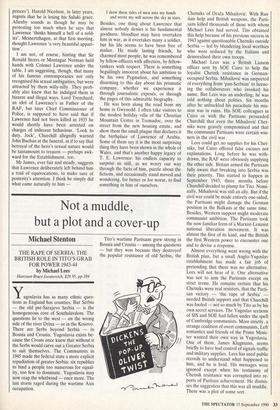Not a muddle, but a plot and a cover-up
Michael Stenton
THE RAPE OF SERBIA: THE BRITISH ROLE IN TITO'S GRAB FOR POWER 1943-44 by Michael Lees
Harcourt Brace Jovanovich, $29.95, pp.384
Yugoslavia has as many ethnic ques- tions as England has counties. But Serbia — the old pre-Sarajevo Serbia — is the homogeneous core of Southslavdom. The questions lie to the west — on the wrong side of the river Drina — or in the Kosovo. There are Serbs beyond Serbia — in Bosnia and Croatia. Yugoslavia exists be- cause the Croats once knew that without it the Serbs would carve out a Greater Serbia to suit themselves. The Communists in 1945 made the federal state a more explicit repudiation of greater Serbia: six republics to bind a people too numerous for equal- ity, too few to dominate. Yugoslavia may now reap the whirlwind — once more. The last storm raged during the wartime Axis occupation. Tito's wartime Partisans grew strong in Bosnia and Croatia — among the questions — but they won because they destroyed the popular resistance of old Serbia, the Chetniks of Drah Mihailovid. With Rus- iian help and British weapons, the Parti- sans killed thousands of those with whom Michael Lees had served. Tito obtained this help because of his previous success in 1943 against questionable Chetniks outside Serbia — led by blundering local worthies who were seduced by the Italians and demoralised their own troops.
Michael Lees was a British Liaison officer sent by SOE Cairo to help the loyalist Chetnik resistance in German- occupied Serbia. Mihailovid was suspected of everything from 'pan-Serbism' to licenc- ing the collaborators who invoked his name. But Lees was an underling; he was told nothing about politics. Six months after he unbuckled his parachute his mis- sion was in ruins. His SOE colleagues in Cairo or with the Partisans persuaded Churchill that even the Mihailovid Chet- niks were gravely compromised and that the communist Partisans were certain win- ners in the civil war.
Lees could get no supplies for his Chet- niks, but Cairo offered false excuses not explanations. Long before he was with- drawn, the RAF were obviously supplying the other side. Britain armed the Partisans fully aware that breaking into Serbia was their priority. This started to happen in September 1943, three months before Churchill decided to plump for Tito. Nomi- nally, Mihailovid was still an ally. But if the civil war could be made entirely one-sided, the Partisans might damage the German position in the Balkans at the same time. Besides, Western support might moderate communist ambition. The Partisans took the now familiar form of a Marxist-Leninist national liberation movement. It was almost the first of its kind, and the British the first Western power to encounter one and to devise a response.
Almost everything went wrong with the British plan, but a small Anglo-Yugoslav establishment has made a fair job of pretending that there was no alternative. Lees will not hear of it. One alternative was not to arm the Partisans except on strict terms. He remains certain that his Chetniks were real resisters, that the Parti- san victory — 'the rape of Serbia' — needed British support and that Churchill was fooled — not so much by Tito as by his own secret services. The Yugoslav sections of SIS and SOE had fallen under the spell of Cambridge communists. More strictly, a strange coalition of overt communists, Left romantics and friends of the Prime Minis- ter wanted their own way in Yugoslavia.
One of them, James Klugmann, seems briefly to have had control of signals traffic and military supplies. Lees has used public records to understand what happened to him, and he is livid. His messages were ignored except when his testimony of Chetnik resistance was corrupted into re- ports of Partisan achievement. He dismis- ses the suggestion that this was all muddle. There was a plot of some sort. But was it simple subversion Or an imperial cabal of high Tories and low Marxists? Nothing very certain emerges. James Klugmann was a Muscovite, but what exactly did he do? Lees knows that only a meticulous inspection of closed records could recover this story. He does not expect to outrun the excuses and justifications, the 'received wisdom', of the old Tito-hands: the men and women with the post-war jobs in the civil service, journalism and the universities, the people with reputations and medals. He appeals to the younger scholar now at work on the Official History, who has already written one rather 'received wisdom' account of wartime Yugoslavia, to use unique archival privileges to tell it like it was.
It is hard to get beyond shrewd guesses. Klugmann was not a mole. His views were as half-exposed as the opinions of other 'communists working on Balkan affairs. Important non-communists — intelligence officers, diplomats and generals — were persuaded by eloquence and evidence.
Their decisions reflected a defensible, if incorrect, sense of opportunity. But Lees rejects their arguments and distrusts their evidence. The fragments he can check from personal knowledge are false. He wants a full list of specialists who briefed Fitzroy Maclean, Churchill's envoy, before he left for Tito's HQ.
Lees takes hold of only part of the debate. Whatever was done in Greece, it would have been perilous to stop the Yugoslav Partisans by force. There was a case for investing in success and making a friendly gesture to Moscow. Besides, halt the romance of empire was sitting in judgment over the distant competition of warriors, tribes and religions. When the red stars turned against the flowing beards there was a strange imperial epilogue. SOE Cairo called on Britain to use 'the Left' to stem Russian influence. Lees and his col- leagues were left to taste, as T.E. Lawr- ence did, the bitterness of imperial man- oeuvre gone wrong.
Lees may be right in arguing that no- thing much was achieved by arming the Partisans. That one tentacle of the Philby business stretched towards Cairo is also likely. If there was an octopus, why not an eighth man? But it may be that this simply added bells and whistles to a repudiation whose origins lie in British doubts about the Serbs and the intoxicating Chiefs of Staff idea that with the surrender of Italy there might be a German collapse in the Balkans.
Further evidence that the Chetniks of Serbia were undoubted resisters is always welcome. Lees has the right to fire off his passionate broadside against 'the Titophiles' who sent him to Serbia as a know-nothing pawn. He is pleading for explanation to replace post-war clichés. But there is a note of pessimism. Our received wisdoms are so much tougher than anyone else's.



























































 Previous page
Previous page